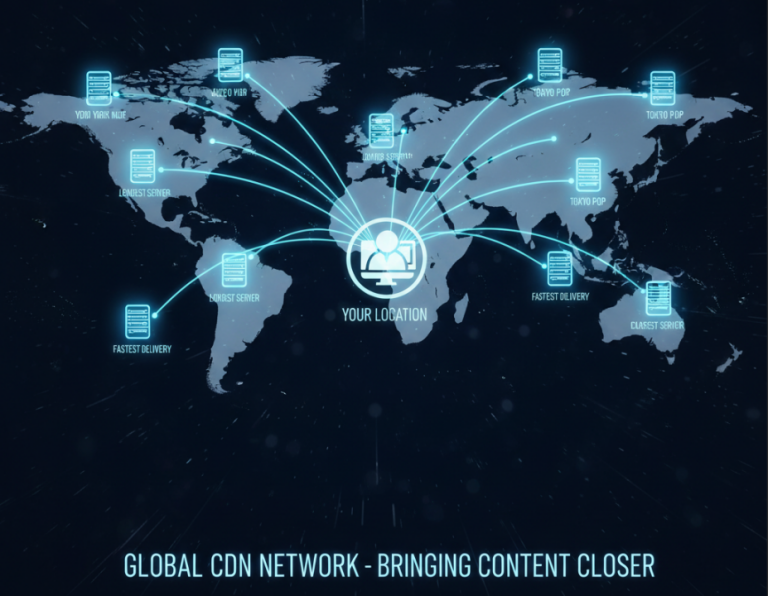
Have you ever experienced this? You're excitedly browsing a new online store, and you spot a T-shirt you love. You click on it to get a closer look, but the page just won't load. The images spin and spin, but for what feels like an eternity, all you see is a blank space. Your patience, much like a sandcastle in the tide, is slowly but surely eroding. Frustrated, you close the browser and move on to a competitor. In a matter of seconds, that store has lost a potential customer forever. It sounds absurd, doesn't it? But this is a daily reality for e-commerce sites everywhere. You might think you’re just interacting with a website, but what you’re really doing is battling the laws of physics.
Our online world is a lot like a vast, global logistics network. Your website, in this scenario, is a massive warehouse located in a distant suburb. When a user needs a package—in this case, your web page data—you have to ship it from that remote warehouse through countless complex and congested highways (the internet's physical lines) to their doorstep. If your user is on the other side of the planet, that package might have to cross continents and oceans to get there. Every traffic light, road closure, and fender bender along the way—or in technical terms, network latency, data packet loss, and routing congestion—makes the delivery time unpredictable and long. You might think a few hundred milliseconds of delay is nothing, but did you know that Amazon once calculated that every 100 milliseconds of latency could lead to a 1% drop in sales? That's not a small number; it's the kind of thing that keeps e-commerce owners up at night.
So, is there a way to get your package to a user instantly, no matter where they are? This is the core purpose of a Content Delivery Network, or CDN. Think of it as a global chain of warehouses for your website's products. All of your web data—those images, videos, CSS files, and JavaScripts—are pre-packaged and stored in these warehouses all over the world. When a user wants to visit your site, this smart logistics system instantly figures out which nearby warehouse is closest to them and delivers the package directly from there. It's like a new convenience store suddenly opening up on your street. You no longer have to drive to the central mega-supermarket downtown for a gallon of milk; you can just walk downstairs and be back in a minute. It’s a sudden, almost magical, solution.
Beyond Speed: How a CDN Remakes the E-commerce User Experience
Speed, of course, is the most obvious benefit of a CDN. But its magic goes far deeper than that. It’s actually about building a bridge of trust between you and your customer.
Think about it: when your customer is browsing your product pages and the images load instantly, the videos play smoothly, and the page scrolls effortlessly, what message does that send? It says you're professional, reliable, and you care about the details. This seamless experience significantly improves their shopping mood. They're not frustrated by waiting; they can focus entirely on your products. This positive emotional connection directly translates into higher conversion rates. And if your site is especially fast on mobile devices, this advantage is even more pronounced. We all know that most traffic now comes from phones, and a slow mobile site is basically a form of business self-sabotage. A CDN is the key to solving this, providing optimized content to mobile users regardless of their network conditions.
And that's not all. A fast website is also more appealing to search engines. Google and other engines have long used site speed as a crucial ranking factor. A slow-loading site is like a race car that drives like a snail; no matter how good its content is, it will struggle to win in a crowded field. By speeding up your site, a CDN essentially installs a rocket engine on your car, leaving your competitors in the dust. You don’t have to spend more on ads to get more organic traffic.
The Invisible Shield: Is Your Website Truly Secure?
We often equate a CDN with speed, but we overlook its other vital function: security. You might be wondering, how can a network that delivers content also be a guardian of security?
Think of it this way: your website's server is your digital vault. The CDN, then, is a team of armed bodyguards you’ve stationed all around that vault. When someone tries to attack your site—for example, by launching a DDoS (Distributed Denial of Service) attack—a flood of malicious traffic attempts to overwhelm your server. But with a CDN, this flood is absorbed and filtered by the CDN’s global network of nodes. Your server, your vault, remains untouched and safe. The CDN acts as a massive filter, blocking the harmful traffic and only allowing legitimate requests to pass through.
Furthermore, many top-tier CDN services come equipped with a Web Application Firewall (WAF), which can identify and block common threats like SQL injections and cross-site scripting attacks. It's like installing an intelligent security scanner at your website's entrance, ensuring only "good actors" can get in. For an e-commerce site, this is non-negotiable, as you're handling sensitive customer data like credit card information and personal details. If your site is compromised by a security breach, your reputation can be permanently damaged. A CDN works silently in the background, building a strong defense so you can focus on growing your business without constant worry.
Choosing Your "Logistics Partner": A CDN Selection Guide
Now that you understand the critical importance of a CDN, the next step is choosing the right one. The market is flooded with CDN providers, so how do you pick the one that fits your needs?
First, consider the coverage. Where are your customers primarily located? If they are mostly in Asia, but your CDN provider only has a couple of nodes there, the acceleration effect will be minimal. A CDN with an extensive global network is like a logistics company with warehouses in every major city; it ensures your content can be delivered quickly no matter where it's going. For e-commerce businesses targeting a global market, choosing a CDN with a strong presence in Asia, Europe, and North America is absolutely essential.
Second, look at the features. A good CDN shouldn't just offer simple content acceleration. It should provide advanced features like SSL certificate management, custom rules, HTTP/2 support, and a robust API. These features give you more granular control over your content delivery and allow for more fine-tuned optimization. For example, if you need to control caching for a specific file or display different content for users in a certain region, a feature-rich CDN can handle it with ease.
Third, prioritize security features. Don't just focus on speed. Place security features on an equal footing. DDoS protection, a WAF, and bot management are standard for a high-quality CDN. In the digital world, security isn't an option; it's a fundamental requirement.
Finally, don't forget about customer support. When you run into a problem, you want fast, professional help. A CDN provider that offers 24/7 multilingual technical support is like having a personal assistant on standby, giving you peace of mind.
Stop letting your customers leave because of a few seconds of waiting. Stop letting your website fall behind the competition. Imagine your customer clicking on your site, and the page loads instantly, with images and videos appearing in a flash. They browse with ease, make their selections without frustration, and complete their purchase smoothly. When they share your site with their friends, they’ll say, "This website is so fast!" That's more effective than any ad you could ever run. A CDN isn't just a nice-to-have add-on; it's a foundational element for your e-commerce business to survive and thrive in today's fast-paced world. It's not just about delivering data; it's about building a faster, safer, and more trustworthy brand.

